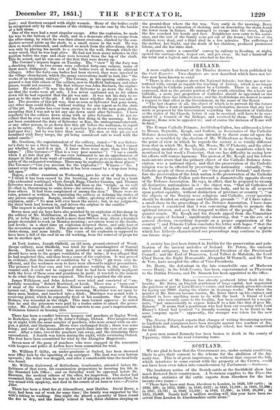IRELAND.
A more explicit abstract of the Thurles decrees has been published by the Cork Reporter. Two chapters arc now described which have not be- fore now been known to exist.
" There is also a chapter about the National Schools ; but they are not in- terfered with, except as regards the teaching of history, which is no longer to be taught to Catholic youth unless by a Catholic. There is also a wish expressed, that as the greater portion of the youth attending the schools are Catholic, a more just proportion of Catholics should be appointed on the Board than there has hitherto been ; and the Archbishops are desired to make a request to that effect to the Government, in the name of the Synod.
"The last chapter of all, the object of which is to prevent for the future anything like a want of unanimity among ecclesiastics, decrees that any law made or proposed by the Government regarding the education of Catholics or the rights of the Church, before it can be received, will have to be exa- mined by a Council of the Bishops, and received by them. Should they disagree, Rome is to be appealed to ; and of course the decision of Rome will be final."
The Roman Catholic Primate, Archbishop Cullen, has addressed a letter to Messrs. Reynolds, Keogh, and Sadleir, as Secretaries of the Catholic Defence Association, which seems intended to throw some oil upon the waters so troubled by the election of Mr. Wilberforce as Secretary ; but the point of view in which he regards the society is so totally different from that in which Mr. Keogh, Mr. Moore, Mr. O'Flaherty, and the other protesting members of the brigade, view it in the manifesto which we mentioned in last week's Postscript, that one has difficulty in seeing how his efforts will restore harmony. The protest of Mr. Keogh and his fellow malcontents avers that the primary object of the Catholic Defence Asso- ciation was a national object, and that the preservation of the Catholic religion was to be effected by preserving the nationality : virtually, "the Catholic people of these realms " are " the people of Ireland," and there- fore the preservation of the Irish nation is the preservation of the Catholic faith. But Primate Cullen puts forward a diametrically opposite theory of the Defence Association. He says, in effect, that he proposed to swamp all distinctive nationalities in it : the object was, "that all Catholics of the United Kingdom should constitute one body, and be in all respects upon perfect equality, without distinction of province or country "; " as the objects of the Society were religious and Catholic, every question should be decided on religious and Catholic grounds ": " if I have taken a small share in the proceedings of the Defence Association, I have done so because I considered that I was concurring directly to promote the spiritual interest, and next, the temporal welfare of the people." So the quarrel stands. Mr. Keogh and his friends appeal from the Committee to the people of Ireland ; significantly observing, that " on the eve of a general election, everything depends on a proper organization of the country "; and Primate Cullen concludes his letter with hopes " that the same spirit of charity and generous toleration of difference of opiyion which has hitherto characterized our proceedings may continue to guide our future steps."
A society has just been formed in Dublin for the preservation and pub- lication of the ancient melodies of Ireland. Dr. Petrie, the eminent artist and antiquary, has been nominated President of the Provisional Council ; and the Earl of Dunraven, Lord Talbot de Malahide, the Lord Chief Baron, the Right Honourable Alexander M'Donnell, and Sir Vere de Vere, have accepted the office of Vice-Presidents.
Dr. Harty, the defendant in the late remarkable case of Mathews versus Harty, in the Irish Courts, has been superannuated as Physician to the Dublin Prisons, and Dr. Bannon has been appointed to the office.
The murder of Mr. Bateson has already produced bitter fruit for the locality. Mr. Bates, an English gentleman of large capital, had negotiated the purchase of part of Lord Blaney's estate, and had already given directions for laying out 2000/. during the winter in drainage-works. But when the murder of Mr. Bateson became known, Mr. Bates threw up his contract and declined to have anything more to do with the land. A friend of Lord Blaney, who recently came to the locality, has been cautioned by a magis- trate, "not unnecessarily to expose himself to a fate like that of poor Mr. Bateson." It seems that a gentleman who had been out coursing with Lord Blaney's friend had received " a friendly warning not to be found in the same company again" : apparently, the stranger was taken for the new agent.
The Newry Telegraph reports that charges of writing threatening notices to landlords and rentpayers have been brought against two teachers of Na- tional Schools. Hart, teacher of the Cloghoge school, has been committed for trial.
A poor man named Kennedy has been beaten to death in the county of Tipperary, while on the road returning home.


























 Previous page
Previous page